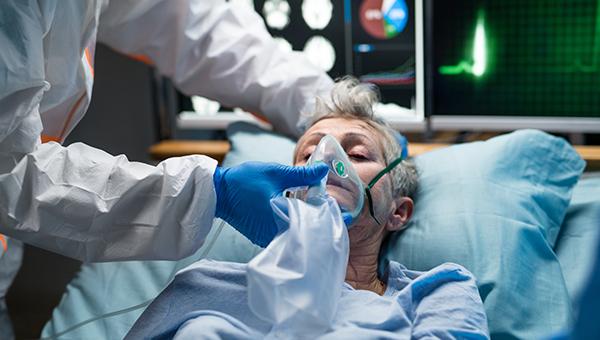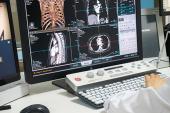Myocarditis in Unvaxxed Patients Hospitalized With COVID-19: New Insights
Concomitant pneumonia was associated with increased hemodynamic instability, need for circulatory support, and death.

Among those hospitalized with COVID-19, definite/probable acute myocarditis occurs in roughly 2.4 of every 1,000 patients, according to an international analysis from the United States and Europe. When the researchers included “possible” cases of myocarditis, the prevalence rose to 4.1 cases per 1,000.
While much of the myocarditis making headlines during the pandemic has stemmed from the very rare cases linked to mRNA vaccines, the current analysis addresses the risk following COVID-19 infection itself, focused on patients hospitalized for severe illness.
“This analysis indicates that, although rare, hospitalized patients with acute myocarditis associated with COVID-19 infection have a much greater need for intensive care unit admission, in up to 70.5% of the cases, despite the average age of the individuals in the study being much younger than expected at 38 years old,” said co-lead study author Marco Metra, MD (University of Brescia, Italy), in a press release.
The researchers note that the reported prevalence of definite/probable myocarditis in hospitalized COVID-19 patients has varied markedly depending on the criteria used for diagnosis. Early in the pandemic, a controversial study from German investigators reported abnormal CMR findings in 78 of 100 patients with relatively mild COVID-19, and smaller studies of athletes, like one at Ohio State University, showed an unusually high incidence of myocarditis and myocardial injury in those with mild COVID-19 illness.
The totality of data would suggest that those having myocarditis related to the virus . . . seem to have a more-severe potential disease course than those with [myocarditis from] mRNA vaccination. Ty J. Gluckman
“This study calls out the fact that at least among the hospitalized patient population, rates of myocarditis are higher than have been reported in an unselected COVID-19 population previously,” said Ty J. Gluckman, MD (Providence Heart Institute, Portland, OR), who was not involved with the study. “It also shows that when people are diagnosed in the hospital, these are patients who frequently require the ICU, with upwards of 40% needing medications or mechanical circulatory support.”
Gluckman recently led a new expert consensus decision pathway from the American College of Cardiology on managing COVID-related cardiac problems in adults, including myocarditis and postacute sequelae of SARS-CoV-2 infection (PASC). He added that the current study also sheds light on a surprisingly high rate of cardiogenic shock, seen in 38.9% of patients with COVID and myocarditis, which “exceeds that which has been reported in the literature predating COVID. So, other forms of viral infection don't seem to manifest the same rate of shock.”
Those With Pneumonia Fare Worse
For the new study, published in Circulation, researchers led by Metra and Enrico Ammirati, MD, PhD (Niguarda Hospital, Milan, Italy), reviewed data on 56,963 hospitalized COVID patients (median age 38 years) from February 2020 through April 2021, 54 of whom also had myocarditis. Chest pain and dyspnea were the most frequent symptoms at presentation. None of those included in the study had received a COVID-19 vaccination prior to developing myocarditis. The majority of myocarditis cases were confirmed with endomyocardial biopsy or cardiac MRI.
Twenty-three patients (42.6%) had pneumonia, which was associated with greater need for supplemental oxygen (73.9% vs 32.2%; P = 0.005). Those with versus without pneumonia tended to be older, had more acute respiratory distress syndrome and septic shock, had lower oxygen saturation and higher lactate levels on admission, and more frequently reported cough and dyspnea. Of the three patients in the study who died (5.5%), all had pneumonia.
Nearly 40% of the population received an inotropic or vasopressor agent. Those with pneumonia were significantly more likely than those without to receive norepinephrine, chloroquine, and ritonavir/lopinavir. Patients with pneumonia also were more likely to develop hemodynamic instability, and require temporary mechanical circulatory support. The researchers say in most cases where patients received corticosteroids a rapid increase in left ventricular ejection fraction was observed.
The median length of hospital stay was 13 days. By 120 days, the estimated mortality rate was 6.6% in those with COVID-19 and acute myocarditis. None of the deaths were cardiac-related, and no patients required heart transplantation.
Ammirati and colleagues note that those over age 70 were excluded due to greater likelihood of age-related cardiac issues on MRI. Other limitations of the study include not screening some patients for other viruses or immunological causes of myocarditis, and the possibility that some myocarditis cases were missed due to high case volumes during the pandemic.
Ongoing Questions
Since the study is a snapshot in time in the rapidly changing clinical landscape of COVID-19 prior to wide availability of vaccines, Gluckman said, it’s hard to know if patients with myocarditis treated in 2022 might experience milder illness than those in the study, especially if they were infected with the Omicron variant, which has been shown to be less likely to cause pneumonia.
“We also have therapeutics now that are available to help address these individuals, whether diagnosed in the outpatient setting and initiated early on, or [started] when they're hospitalized,” he said. “But what should remain a key takeaway in this population of patients is that we know they can progress very quickly.”
Gluckman said this study taken with the other evidence to date support the public health stance that rates of myocarditis related to SARS-CoV-2 infection exceed those related to COVID-19 mRNA vaccination and that vaccination helps mitigate the most severe complications, which would include hospitalization for myocarditis.
“I think it's a fair inference to say the totality of data would suggest that those having myocarditis related to the virus, as supported by this series, seem to have a more-severe potential disease course than those with [myocarditis from] mRNA vaccination, recognizing that there have been deaths in people in both groups, although infrequent,” he added.
The US Centers for Disease Control and Prevention (CDC) currently recommend that individuals with prior myocarditis unrelated to getting a vaccine still be vaccinated against COVID 19 after their myocarditis episode is resolved. For those who develop myocarditis after a dose of an mRNA COVID-19 vaccine, the CDC suggests risk assessment and waiting until the episode has resolved to receive any further vaccination or booster.
Although little data are available on recurrence in patients who have had a history of myocarditis related either to COVID-19 or vaccination, Ammirati and colleagues say no recurrences were reported in 15 patients in their study for whom they had data on subsequent vaccination after hospitalization. Additionally, Gluckman noted that a study of 55 patients that was presented last month at the European Society of Cardiology’s Acute CardioVascular Care conference also found that SARS-CoV-2 vaccination in patients with a history of confirmed acute myocarditis was not associated with a risk of recurrent myocarditis or other serious side effects. Most of the patients in the study received the Pfizer/BioNTech vaccine.
L.A. McKeown is a Senior Medical Journalist for TCTMD, the Section Editor of CV Team Forum, and Senior Medical…
Read Full BioSources
Ammirati E, Lupi L, Palazzini M, et al. Prevalence, characteristics, and outcomes of COVID-19-associated acute myocarditis. Circulation. 2022;Epub ahead of print.
Disclosures
- Ammirati reports no relevant conflicts of interest.
- Metra reports personal fees from Actelion, Amgen, Livanova, Servier and Vifor; and advisory board/speakers’ fees from AstraZeneca, Abbott, Bayer, Boehringer lngelheim, and Edwards.




Ayhan Olcay